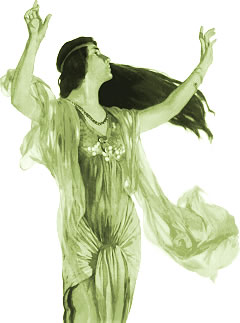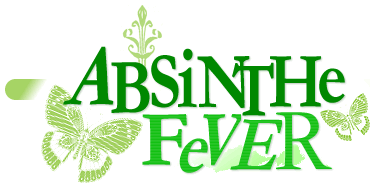
The effects of absinthe? Many, and some quite inexplicable. As all fans of the special green liquor know, this truly is a drink in its own class -- and we are not talking about absinthe's fascinating history, or its romantic connections to the art world. This time, we are talking about the phenomenal effects of absinthe on a drinker's mental faculties and sense of reality. This time, we are talking about absinthe effects on the mind.
The clear-headed form of inebriation -- so odd for a drink that typically contains between 50 and 70 per cent of alcohol -- never fails to surprise those who reach for a glass for the first time:
"People always remark how odd it is," says Dan, a Manchester party host. "They expect to feel drunk as they would on any other spirit, but it doesn't quite work in the usual way with absinthe. Somehow, absinthe just has a different effect on people. Maybe it is a kind of drunkenness, but it's a weird kind of drunkenness, with this bizarre clarity of thought that comes with it."
But absinthe's surprising effects don't end here.
Arthur Rimbaud, the famous French poet, sipped the green drink to liberate the "sacred thing" (his mind) as he daydreamed "voyages of discovery that nobody had heard of" and "every kind of magic". Ernest Hemmingway called absinthe "brain-warming, idea-changing liquid alchemy". Many other artists and writers regularly enjoyed the company of the Green Fairy (the drink's affectionate nickname) in search of inspiration.
But you don't have to be a great poet to experience absinthe's inexplicable, consciousness-shifting effects. Gary Fuller, a successful London lawyer and a avid absinthe fan, described what the Green Fairy does for him:
"It is as if you are here, but, at the same time, your mind also enters some other, higher level of awareness. Suddenly, you gain the capacity to observe and understand reality from another perspective. It is as if you have tapped into some strange but wonderful source of information, understanding and creativity. Your mind is crystal clear, your perception is enhanced, rich creative powers unlocked. Ideas, answers, solutions and inspiration rush towards you from all directions."
Drinking absinthe, it seems, does have the perplexing effect of "illuminating the mind", as one French doctor put when writing, in 1872, of the transformations the mind undergoes under the Green Fairy's influence. The doctor was especially intrigued by the odd absinthe phenomenon of enhancement in sensory perception. Rather than dulling one's senses, as would be expected from a drink so high in alcohol, absinthe has the opposite effect. The doctor wrote:
"The most curious thing about the transformation of the sensorial apparatus -- the phenomenon, at least, that struck me most forcibly in the experiments I conducted on myself -- is that all sensations are perceived by all senses at once. My own impression is that I am breathing sounds and hearing colours, that scents produce a sensation of lightness or of weight, roughness or smoothness, as if I were touching them with my fingers."
It is generally believed that thujone -- the substance naturally present in the wormwood plant from which absinthe is made -- is largely responsible for the remarkable effects of the drink. Precisely how thujone produces such effects, however, remains a mystery.
Some claim that thujone compels the mind to enter a different level of awareness. In this state, apparently, the mind is able to connect with some sort of universal consciousness or intelligence from which it then draws its enhanced abilities.
Others stop short of making a connection with the supernatural. In their view, we don't tap into any mystical source, we just tap into a rich subconscious source that is hidden deep within each of us, a source that our usual conscious self cannot easily access otherwise.
The thujone in absinthe, it is thought, removes the blocks that normally prevent the mind -- and the senses -- from working at full capacity. Essentially, absinthe gives the mind the green light to be completely free, at least for a time. In this state, the usually docile subconscious mind is awaken and begins to work in tandem with our conscious awareness -- hence the perception of reality on two different levels. Our creative, cognitive and perceptive abilities reach new heights as a result.
Modern science has also tried to explain the unusual effects of the absinthe drink. Under the title "Absinthe Makes Neurons Run Wild", Corinna Wu, writing for the Science News magazine, described research in 2000 into the effects of the wormwood herb on the human brain.
Conducted by researchers at the University of California, Berkeley and Northwestern University Medical School in Chicago, the study has found that wormwood -- as well as other ingredients in absinthe -- cause "CNS cholinergic receptor binding activity". This, according to scientists, has the effect of improving cognitive functions of the brain.

Editor-picked posts about absinthe effects
Visitors to this site have posted additional material on the topic of absinthe effects. We especially like Green Fairy (my experience) by Thom on Sat, 12 May 2007 at 16:03, as well as Century Absinthe Review by Matt Summers on Mon, 7 May 2012 at 10:36.

Got something to say about absinthe effects?
At Absinthe Fever, we encourage you to get involved. In fact, this whole site is meant as an open forum about absinthe, because we believe that absinthe is more than a drink, or a bit of thujone in a bottle. The Green Fairy -- the affectionate name given to the absinthe drink in the 19th century -- is art, poetry, experience, lifestyle... So join us and share your thoughts anywhere on Absinthe Fever!
53 people have
posted messages
to this page.
Read messages (53)
Post your message
Copyright © 2006 AbsintheFever.com Contributors.
All Rights Reserved.


About absinthe effects
When it comes to the effects of drinking absinthe, people's opinions -- and experiences -- vary wildly. Some go as far as to claim the drink is psychoactive, while others say there is no "secondary" (that is, other than alcohol-induced) effect at all.
As early as 1993, Matthew Baggott posted his Absinthe FAQ in the Usenet newsgroup "alt.drugs" (there wasn't much of the web as we know it back then). As you will suspect from the newsgroup's name, the issue of absinthe's "psychoactive qualities" was one of the interests of the document.
Some people take it further still. We definitely do not recommend any experiments with Paxil and absinthe (nor, for that matter, mixing any medicine with alcohol). Anyway, it's quite clear which way the wind blows here, since Jasmine Sailing's bizarre piece more or less concludes absinthe is a narcotic. Is it really? Yup, it does read like the girl was out of her mind when she wrote the page -- and no, we don't think the Fairy was to blame!
A far more sober look at the effects of the Green Fairy can be found in "The Return of the Green Faerie", an article written by Frank Kelly Rich of the Modern Drunkard magazine (no pun intended). Recommended reading.




What is absinthe?
What is the history of absinthe?
What is wormwood?
How about thujone?
What are the effects of absinthe?
How do I drink absinthe?
What is "La Louche" ritual?
What is an absinthe fountain?

The freedom-loving Green Fairy...
Goddess of rebel poets & artists in France and beyond
in France and beyond